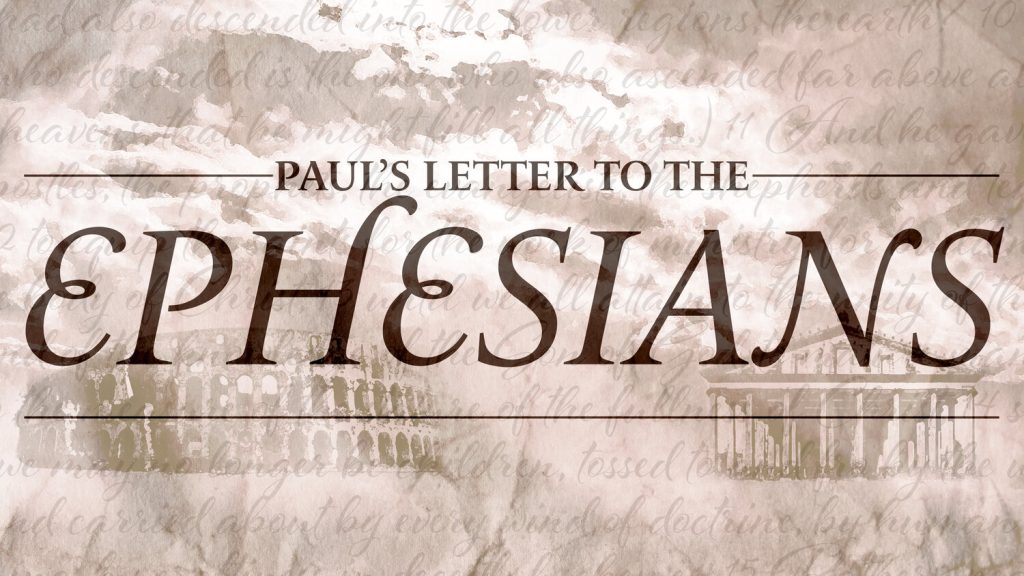This week we will be discussing Ephesians 4:1-16. These verses are the beginning of the second half of Paul’s letter where the apostle lays out the fundamental instructions for living a Christian life. These verses are an introduction and an overture for what follows in the remainder of the letter.
Part Two:
In the first half of Ephesians (Chapters 1-3), Paul reminds (Eph. 1:15) his audience of the great riches of God in Christ through the Spirit in reconciling all people to himself and to one another. In this second half of the letter (Chapters 4-6), Paul writes of how a Christian should conduct himself. In other words, Paul spends the first half of his letter reminding his audience of what they already know so that they will then act accordingly. For Paul, proper Christian ethical behavior should naturally spring from a Christian’s thanksgiving response for what God has, is, and forever will be accomplishing on their behalf.
Our Calling: (v.1)
Paul is clear, that it is God who has called the church out of the world. (Eph. 1:4-5). As we have previously discussed, the church has been chosen and destined to be the recipients of the great revelation of God’s mystery and partakers of the promise in Christ that is overthrowing the powers and principalities of this world so that all might be reconciled to God. Eph. 1:3-10. This is the calling that all of us in the church have received – to be the light of Christ in a non-Christian world. Matt. 5:16. Paul desires each of us to think deeply through this calling that everyone in the church has received. Only once we understand and appreciate this calling can we then begin to live a life worthy of the call.
Christian Ethical Virtues: (v.2)
Paul quickly lays out the four primary ethical virtues of a Christian life: humility, gentleness, patience, and loving endurance. v.2. Paul gives similar lists, for example, in his discussion of Love in 1 Corinthians 13, the Fruit of the Spirit in Galatians 5:22-23, and elsewhere where Paul writes of the characteristics of a life in Christ. See, Rom. 12, 1 Thess. 4.
As we looked at in our discussion of Philippians 2, humility was not a virtue in the Greco-Roman world and was considered by Aristotle to be the vice of being a “small-souled” man. Ethics, Bk. 4.3. The gentleness that Paul writes about is the gentleness of Christ in his Passion where we are to bear another’s sins and burdens. Gal. 6:1. The word Paul uses for “patience” is makrothymia which literally means “slow anger” or “waiting for a sufficient time before expressing anger.” Paul knows that any community will have its irritations, and his instruction is not to react too swiftly. Likewise, Paul’s fourth virtue is that Christians must put up with one another in love. Love is not irritable and it bears all things. 1 Cor. 13:7-9. These four virtues are those that will allow the Christian community to maintain its Unity in the Spirit.
Unity in the Spirit: (v. 3)
As we discussed several weeks ago, the unity of all humankind in Christ is the sign of God’s coming reign over the whole world. Eph. 2:14-16, 3:10. Paul is not instructing the church to create this unity. Rather, for Paul, this unity has already been created by the Holy Spirit, and Paul’s instruction is for the church to simply maintain the unity that already exists. The four virtues that Paul mentions in v.2, are those virtues that Paul sees as being necessary for the maintenance of this unity, and thereby necessary to maintain that visible symbol of Christ’s victory over the powers and principalities of this world (who have different virtues).
A Trinitarian Confession: (vv.4-7)
After his exhortation to the church to maintain unity, Paul gives his audience a further theological and practical basis for maintaining this unity. These words may have been part of an early baptismal or confessional rite and, hopefully, you recognize these words as forming the opening responses to our baptismal liturgy. Notice the numerological and trinitarian formulation.
Paul writes that there is one body (the church, see, 1 Cor. 12:12-13), one Spirit (who builds up and sanctifies the church), and one hope (the comes from the Spirit, Rom. 15:13, Gal. 5:5). There is one Lord (in heaven and on earth, Rom. 10:9), one faith (in Christ, Gal. 2:16), and one baptism (in Christ, Rom. 6:4). Therefore, there is one God and Father of us all (1 Cor. 8:6, 15:28).
Paul writes of seven “ones” representing wholeness, perfection, and completion. Paul assigns three “ones” respectively to the Son and to the Spirit reinforcing the Trinity. However, Paul only assigns one “one” to the Father representing the unity of the Trinity. It is an elegant formulation.
Dinner is a 6. The menu is Kentucky Hot Browns. Discussion about 6:45. Compline around 8. Hope to see you here!
I appeal to you therefore, brethren, by the mercies of God, to present your bodies as a living sacrifice, holy and acceptable to God, which is your spiritual worship. Do not be conformed to this world but be transformed by the renewal of your mind, that you may prove what is the will of God, what is good and acceptable and perfect. Romans 12:1-2


Pingback: Ephesians 6:10-20, Armor of God – Ancient Anglican